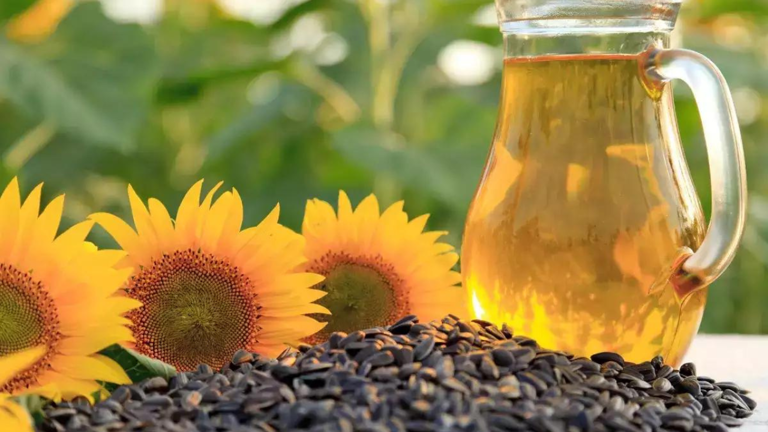Context:
Recently, the Union Cabinet approved the National Mission on Edible Oils – Oilseeds (NMEO-Oilseeds), to boost domestic oilseed production and achieve self-reliance (Atmanirbhar Bharat) in edible oils.
National Mission on Edible Oils – Oilseeds (NMEO-OS)
- The Mission will be implemented over a seven-year period from 2024-25 to 2030-31, with a financial outlay of ₹10,103 crore.
- Crops Coverage: NMEO-Oilseeds will enhance the production of key primary oilseed crops such as Rapeseed-Mustard, Groundnut, Soybean, Sunflower, and Sesamum, as well as increase collection and extraction efficiency from secondary sources like Cottonseed, Rice Bran, and Tree Borne Oils.
Aim: The mission aims to increase primary oilseed production from 39 million tonnes (2022-23) to 69.7 million tonnes by 2030-31.
- domestic edible oil production to 25.45 million tonnes by 2030-31Together with NMEO-OP (Oil Palm), it aims to increase domestic edible oil production to 25.45 million tonnes by 2030-31 meeting around 72% of our projected domestic requirement.
Implementation: The target will be achieved by promoting the adoption of high-yielding high oil content seed varieties, extending oilseed cultivation by an additional 40 lakh hectares by targeting rice and potato fallow lands, and promoting intercropping.
- The Mission will harness the ongoing development of high-quality seeds by using cutting-edge global technologies such as genome editing.
- The Mission will also introduce an Online 5-year rolling seed plan through the ‘Seed Authentication, Traceability & Holistic Inventory (SATHI)’ Portal to ensure the timely availability of quality seeds.
- 65 new seed hubs and 50 seed storage units will be set up in the public sector to improve the seed production infrastructure.
Value Chain Clusters: over 600 VCCs will be developed across 347 unique districts which will have access to high-quality seeds, training on Good Agricultural Practices (GAP), and advisory services on weather and pest management.
- These clusters will be managed by value chain partners such as FPOs, cooperatives, and public or private entities.
Significance of the Mission
- The mission will help India in achieving self-reliance (Atmanirbhar Bharat) in edible oils.
- It will immensely benefit farmers, increase capital investment, create employment generation, reduce the import dependence and also increase the income of the farmers.
- This mission will also accrue significant environmental benefits in the form of low water usage, improved soil health, and making productive use of crop fallow areas.
Status of Edible Oil/Oilseeds Production in India
- India is the fourth largest oilseeds producer in the world after the USA, China and Brazil, accounting for 10% of global production.
- Rajasthan, Madhya Pradesh, Gujarat, and Maharashtra were the top oilseed-producing states during 2021-22 with a share of about 23%, 21%, 18% and 16% of the total production, respectively.
- Presently, India is a net importer of edible oil, with 57% of the total edible oil being imported from various countries.
- However, the import dependency on edible oils has been reduced from 63.25% in 2015-16 to 57.30% in 2022-23 and domestic production has increased from 36.75 % in 2015-16 to 42.71 % in 2022-23 of the total demand of the country.
Government Initiatives for Promoting Self-Sufficiency in Edible Oil

- The Government launched the National Mission on Edible Oils – Oil Palm (NMEO-OP) in August 2021 to promote oil palm cultivation.
- The Government gives a Minimum Support Price (MSP) for 7 oilseeds i.e. Rapeseed-Mustard, Groundnut, Sunflower, Safflower, Soybean, Sesamum, and Nigerseed.
- Also, the continuation of Pradhan Mantri Annadata Aay Sanrakshan Abhiyan (PM-AASHA) ensures oilseed farmers receive MSP through price support and price deficiency payment schemes.
- Additionally, a 20% import duty on edible oils has been imposed to protect domestic producers and encourage local cultivation.
Also Read :
Union Cabinet Merge All Agricultural Schemes under Two Major Umbrella Scheme

